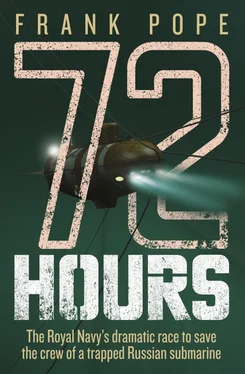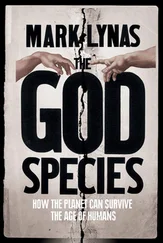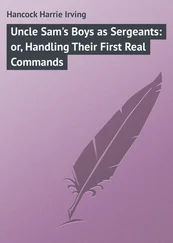‘This deck won’t hold,’ Cave said to Captain Holloway. ‘We’re going to have to strengthen it before installing the crane. Can you ask these guys where the welders we requested are?’
Holloway nodded. He’d asked for three or four welders to be at the ship to meet them in order to speed up their mobilisation, but so far had seen no sign of them. He approached the Ship’s Master, but a huge black dog suddenly appeared on the flying bridge above him, snarling and barking. He tried to ignore it and began talking, but almost immediately another wolf-like animal appeared behind the Master, also barking fiercely. Finally he raised his voice, and explained to the master that the deck needed strengthening to take the crane.
The Master laughed, and after the din had been calmed somewhat, relayed Holloway’s words to his Deck Officer with a smile. The man shook his head, and delivered his reply with upturned palms and a shrug.
Holloway frowned, and turned back to Cave. ‘He says not to worry. Apparently they carried much bigger, heavier equipment than our crane on that bit of deck just last week.’
Cave nodded. Considering the state of the ship that just made his fears worse. ‘We’re going to have to strengthen it anyway,’ he said. ‘We need those welders. I’m going to go and find some suitable steel.’
Holloway turned back to the Master and tried to explain what they needed in order to start work, but suddenly realised he had not got a clue how to say ‘welder’ in Russian. His language training had been tailored to the demands of high diplomacy and cogs of bureaucracy, not to dockyard operations. On deck in his Royal Naval uniform, he began as dignified a mime of a welder as he could muster.
Thankfully it didn’t take long to get the message across, and a bearded Russian soon appeared from a deck store with a weathered looking oxy-acetylene torch. ‘ Da ,’ said Holloway, and added that they needed four such sets.
The Master shook his head. State regulations only permitted one welder to be working at any one time, he explained. Holloway took a deep breath. He should be used to this by now, but somehow he’d hoped it would be different in an urgent rescue situation. Protocol in Russia was a powerful force indeed. Holloway insisted and eventually the Master pulled out his mobile phone and called the port authorities, but it was soon clear how the conversation was going. The port was run by civilians who were remote from the Navy’s problems. They felt no urgency to break the law. Holloway’s attempts at eroding their stance came to nothing, and they were left with just one welder to strengthen the deck and secure their equipment.
Once Pete Nuttall had finished pacing out deck areas to plan the placement of the various pieces of equipment that were now on their way, he joined Cave in the half lit darkness on the pierside, and together they began picking their way through the scrap that lay around in the weeds, looking for suitable pieces of steel to use as reinforcement.
Saturday, 6 August
SS + 55 h
11.30 UK – 14.30 Moscow – 23.30 Kamchatka
Petropavlovsk-Kamchatsky
Nothing was shifting at the security checkpoint. The rain still beat down. The guard was still in his hut, the door closed. Only the minute hand on Riches’ watch was moving, steadily creeping around the face. The frustration was making his skin crawl.
After 30 long minutes, the official reappeared on the other side of the gate. The guard spoke with him for a second, then walked over and handed over the passports without a word. The gate swung open and the bus was waved through. Later it transpired that when a new shift had come on duty they had not been told anything about a foreign military team arriving in the dead of night. Riches suddenly felt a little guilty about his outburst at the gate. In the guard’s position he’d have been just as suspicious.
The bus followed the road onwards into the port, winding round jagged piles of discarded marker buoys, rusting anchors, chains and old boats. Finally it turned a corner and the jetty appeared. Cranes were offloading Scorpio and the rest of the equipment from the lorries. Riches glanced up at the ship that was moored up alongside. Holloway had warned that the Sura-class buoy tender KIL-27 was a little rough, but Riches hadn’t been expecting quite such agricultural technology. She looked as though she’d been abandoned for months, even years.
Just as he was starting to get that sinking feeling again, he saw a familiar figure in Russian uniform at the bottom of the gangplank. The shock of white blond hair was unmistakeable. Gold was leaning forward in his seat. He’d noticed the same man.
‘Would you look at that!’ said Gold. ‘It’s Dmitriy!’
They spilled out of the van and on to the dockside, and Dmitriy Podkapayev came striding over, a big grin on his face, and enveloped both Gold and Riches in bear hugs. Just two months before they’d been with him in the Gulf of Taranto. Russia hadn’t participated in the NATO exercise, but had sent along a handful of observers, and Podkapayev had been one of them. He’d come aboard the UK’s mothership more than once and seemed to have taken a shine to the British way of doing things.
Podkapayev – and his loud, frequent laugh – had been a big presence on the exercise. Having him in Petropavlovsk was a relief for the team as not only would they have an ally but also someone who understood and trusted the way that they worked. Though he spoke no English, it was obvious that he was eager to get things moving as fast as possible. Worry lined his expressive face.
Captain Holloway was waiting at the top of the gangplank to introduce Riches to the Master, who immediately began a welcome speech. The mariner looked as though he was in his mid fifties, with nicotine-stained hands and teeth and wearing a woollen sweater that was unravelling in several places. As the words kept coming, Riches began to try to cut him off, but a look from Holloway stopped him. The Naval Attaché patiently translated the Master’s words, as he described how proud he was that his ship had been selected to assist the British rescue effort.
Dogs were barking, apparently from every part of the ship. The sailors who passed by were all dressed in jeans and black-and-white striped T shirts, their faces unshaven. Riches felt like he’d walked into a rusting, steel-clad gypsy camp. Although the ship was owned by the Russian Federal Navy, the crew were evidently civilians – a similar set-up to the buoy-laying vessels the Royal Navy sometimes contracted to conduct submarine rescue exercises. It turned out that they were devoted to their ship: they’d recently fought and won a battle to save her from the scrapyard. They hadn’t found any more money for upkeep though – KIL-27 looked like she’d had no maintenance during 40 tough years of service.
When the Master finally wound up his speech, Riches thanked him and told him how honoured the team were to be on board and that they were keen to get their gear loaded and secured as soon as possible. The Russian took this as encouragement, and began a tour of the vessel’s essentials. Riches tried to look interested and impressed as they ducked inside the first hatchway and wound their way down a filthy, dimly lit passageway and into the Mess. It was cramped, bare and grimy. If an army marches on its stomach, this one wasn’t going very far, he thought. After looking in on the cabins, they finally began walking aft towards the door that he hoped would get him back out on deck. At the last minute the Master stopped, took his arm and led him back to a scuffed, oil-smeared door just forward of the outer hatchway. With a toothy grin he swung it open.
Читать дальше












